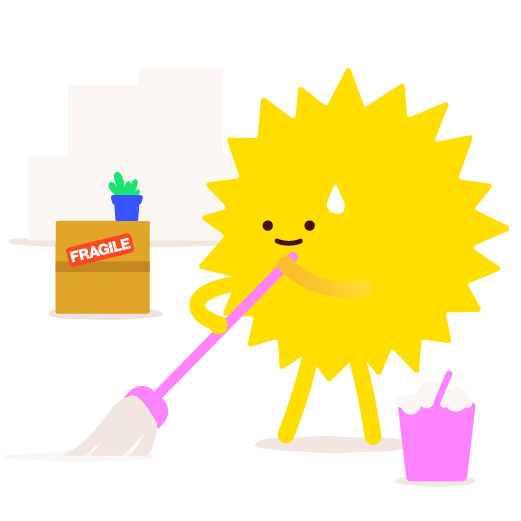Your moving home checklist.
Our easy to follow guide of things to do before moving house.
Moving house can be an exciting yet overwhelming experience. With so many tasks to manage, it's important to stay organised and ensure a smooth transition to your new home.
To help you with this process, we have compiled a comprehensive moving home checklist. Whether you're a first-time buyer or a seasoned mover, this checklist will guide you through the necessary steps before and during your move.

Two months before moving house.
Confirm your move in date.
Get organised.
Sell your unwanted clutter.
Start collecting packing materials.
Confirm your move in date.
It’s a good idea to confirm your move with the estate agent, before organising anything. Once you have arranged the exchange, we suggest you set your moving day a couple of days after you pick up the keys to give you some time to prepare the new property. Remember to book time off work for the move if needed.
Get organised.
Planning ahead can prevent stress during your move. Start a folder with all your important personal paperworks and moving documents, to ensure they don’t get lost whilst packing. Be sure to include documents like your passport, marriage certificate, birth certificate, driving licence, tax paperwork, and other financial documents.
Now is also the time to check with your insurance provider if your home insurance policy covers your new house from the day you move in.
Sell your unwanted clutter.
Take a moment to figure out what items you want to take with you, then start selling your unwanted furniture, clothes, gadgets, and household clutter - every little helps towards your moving costs.
This is a great time to let go of the extra slow cooker you hid at the back of the cupboard, or the armchair that won’t fit in your new place. Decluttering will save time and space on moving day - after all, every item sold is one less to pack!
Start collecting packing materials.
Packing up an entire house requires a lot of cardboard boxes. And don’t forget the packing paper, sticky tape, and labels that will make sure all your things are safe and organised when they get to your new place.
If you get deliveries, start keeping the packaging, and ask friends and family to do the same. You can also try asking local businesses if you can take any of their used packaging - they will often have much larger boxes than your home deliveries.
Don’t worry if you are still a little short, you can buy additional packing materials, but why not save a little money by reusing what’s already around?

One month before moving house.
Book a moving van.
Check for furniture deals.
Let everyone know.
Book a moving van.
If you are looking to book a removal company to help you move, or rent a removal van yourself, it’s a good idea to book in advance to get the best deal.
Remember, if your new home doesn’t have a driveway you should check the parking around the property and make sure you get a parking permit if necessary.
Check for furniture deals.
If you need any big ticket furniture items or white goods for your new home it can be a good idea to start looking early to maximise your chance of spotting a good deal. Plus, some furniture items, such as sofas, need to be made to your specifications - meaning delivery can take several weeks.
Let everyone know.
If you're a first time buyer moving out of a rental property you need to notify your landlord. But that’s not all. There is a long list of people you should alert to your change of address to update your contact details, close accounts, or move your utilities. We’ve put together a handy checklist below.
Plus, remember to drop a message to your friends and family to let them know where they can find you when you move.

Three weeks before moving house.
Redirect your mail.
Meal plan.
Ask the seller for important info.
Redirect your mail.
You don’t want to miss important mail, so make sure you let your Post Office know your moving by setting up a redirect to your new address. That way, all your mail will follow you when you move, even if it doesn’t use your new address.
Simply head to the Royal Mail Redirection to let them know when and where you are moving, although be aware there is a charge.
Meal plan.
If you have a full freezer and cupboards full of open packets, it’s time to start meal planning to use them up. Frozen foods don’t travel well, and open foods may leak during moving. To avoid waste, try to eat what you can before your move with the added bonus of spending less on your food shops.
Ask the seller for important info.
It’s a good idea to ask the previous owner for the locations of important items, such as the main stopcock, electricity and gas, thermostat, and fuse box. Request if they can leave instruction manuals for any fitted appliances too, so you can quickly learn how they work once you’ve moved in.
It’s ideal to make your request a few weeks before the move in date, before they are in the chaos of packing but not so far in advance that they are likely to put it off and forget.

Last week before moving house.
Collect your new keys.
Clean up.
Finish packing.
Prepare your old home.
Pack essentials separately.
Collect your new keys.
If you have planned your move a few days after your exchange, then make sure you still go pick up the keys at the agreed upon time.
Clean up.
One of the biggest reasons to collect your keys a few days before moving in, is that it gives you time to clean your new home whilst it’s still empty. Now’s the time to really put in some elbow grease, so you can have a fresh start when you unpack.
Finish packing.
It’s time to get everything into boxes. Work your way through your home room by room, clearly labelling boxes so it is easy to unpack. Packing takes longer than you think, so chip away at it over the week to avoid a last minute rush.
Anything you haven’t sold or packed should be recycled where possible, and disposed of where not. It’s a nice idea to clean as you pack, particularly beneath any appliances or furniture you are removing.
Prepare your old home.
Just as you have requested from your seller, leave any instruction manuals in an obvious location, label any keys (such as for windows, garages, and back doors), and leave a note with important locations, like theelectricity and gas meters. It always pays to be helpful, as you may find you could use the new occupants' help in future if you accidentally send your online shopping to your old address.
Pack essentials separately.
Prepare a separate bag with essential items you'll need on moving day and the first night at your new home. This could include toiletries, clothing, bedding, and any necessary medications.
I’m moving in
Welcome! If we're the energy supplier to your new home, tell us a few details and we'll help you get set up online.
I’m moving out
For E.ON Next customers, tell us when and where you're moving to and we'll get energy sorted for your new home too.

First week in your new home.
Take meter readings.
Register to vote.
Register with local medical practices.
Find out when your bins are collected.
Move home with E.ON Next.
Explore your new area.
Unpack your essentials
Update your contact information.
Take meter readings.
Before you move out of your old home, make sure you take closing meter readings for your electricity and gas and send them to your energy supplier, even if you are staying with them at your new home or you have a smart meter.
Then, before you start unpacking, take readings from the electricity and gas meters at your new house, to make sure you don’t pay for any energy used by the previous occupants.
If you’re an E.ON Next customer you can submit a meter reading online through your account.
Register to vote.
You can update your details or register to vote online, and often you will receive a reminder in the post after you move. You will need your National Insurance number, but otherwise you simply enter details about your name, address, date of birth, and nationality.
If you don’t register on the Electoral Roll at your new address you won’t be able to vote in your area and you may not receive your postal vote packet.
Register with local medical practices.
Remember to register at your new local GP surgery and dental practice, or you may not be able to access the help you need.
You don’t need to inform your previous practices, as this will be done for you. It’s not always top of mind when we aren’t in need, but it’s important you register as soon as possible as it can take several weeks to be processed - a delay you won’t want to deal with if a medical problem does occur.
Find out when your bins are collected.
The perfect excuse to introduce yourself to your neighbours. Reach out and let them know you’ve moved in, but don’t forget to ask what the bin collection schedule is - you’ll likely have a lot of boxes to recycle in the first few weeks.
Move home with E.ON Next.
If you are an E.ON Next customer, you can let us know you’re moving out online. Even better, you can take us with you when you move by simply letting us know when and where you’re moving home.
Don’t worry if you don’t currently get your energy from us, check out our current tariffs and get a quote online.
Explore your new area.
Take some time to explore your new neighbourhood, locate key amenities, and familiarise yourself with nearby facilities such as shops, schools, and healthcare providers.
Unpack your essentials.
Start by unpacking the essential items you packed separately for your convenience. This will help you settle in quickly and comfortably.
Update your contact information.
Inform your friends, family, and important contacts about your new address and contact details.
Important people to let know you’re moving.
Work through this handy change of address checklist to make sure you’ve alerted important accounts and companies that you’re moving so they can update your registered address.
Finances.
HMRC.
Bank accounts.
Credit cards.
Savings accounts.
Building societies.
Loan companies.
Insurance.
Home (building and contents).
Life.
Health.
Car.
Breakdown cover (vehicle).
Pet.
Personal.
Electoral register.
DVLA (issuer of your driver’s licence).
Employers.
Nurseries.
Schools and colleges.
Universities.
Utilities.
Council tax.
Gas supplier.
Electricity supplier.
Water company.
Boiler maintenance.
TV licence.
Cable or satellite.
Broadband.
Landline and mobile phone contracts.

Make a change for the future with our energy tech.
E.ON can offer you a wide range of energy tech for you and your new home, such as solar panels and EV chargers. Plus, if you're an E.ON Next customer, you can enjoy exclusive discounts.